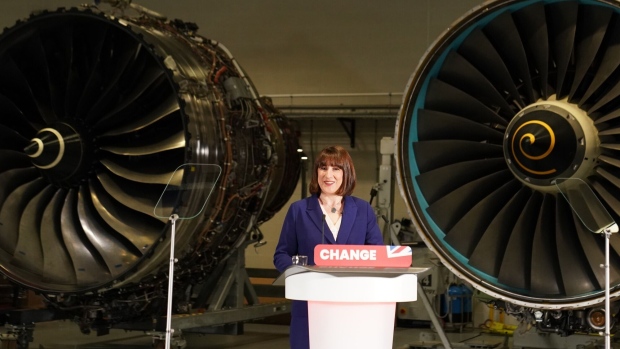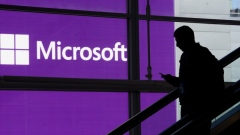May 28, 2024
Labour Not Looking at New Tax Raid on Banks to Balance Budget
, Bloomberg News

(Bloomberg) -- Keir Starmer’s poll-leading opposition Labour Party is seeking to reassure the City of London it is not considering further taxes on Britain’s banks if it wins power at the UK general election on July 4.
Labour is not looking to either impose a windfall tax on banks or increase the surcharge on banking company profits, according to people familiar with the matter. A financial transaction tax is also not in Labour’s thinking, they said.
Holding about a 20-point advantage over Rishi Sunak’s Conservatives in national surveys, Labour is determined to counter Tory claims that Starmer and shadow chancellor Rachel Reeves would increase taxes. It’s a typical Tory attack line, though with the next administration facing the most painful fiscal choices since the 1950s, the influential Institute for Fiscal Studies has accused both parties of not being honest about the need to balance the books.
Even so, Labour is taking the Tory threat seriously. In her first campaign speech on Tuesday, Reeves appeared to rule out tax rises beyond those already announced to fund the party’s spending commitments. They include extending the government’s current windfall tax on energy company profits, taxing private equity bonuses and removing the VAT exemption on private school fees. Like the Tories, they’ve also promised a crackdown on non-domiciled tax status.
“There are no additional tax rises needed beyond the ones that I’ve said,” Reeves told reporters after her speech in Derby. A spokesman for the shadow chancellor also confirmed she had “no plans” for further taxes on banks.
Labour’s position will likely be welcomed in the City, where some banks feared the party might target them rather than increase personal taxation or taxes on other businesses. Last month, UBS analysts said investors were increasingly worried that a future Labour government would go after the sector.
Some City executives feared Labour would consider a windfall tax, either as a straight levy or by reducing the interest paid on Bank of England reserves, people familiar with the matter said. Other options they worried Labour may be planning included raising the surcharge that banks pay on top of corporation tax, or even reviving the idea of a financial transaction tax.
In 2017, when the left-wing Jeremy Corbyn was Labour leader, Reeves wrote an article backing a so-called Robin Hood tax. “I have consistently supported a new tax on financial transactions,” she said, arguing it would “reduce the speculative transactions on companies that result in financial instability.”
Yet Labour’s calculations have changed since Corbyn led the party to an historic defeat in the 2019 election, and Starmer and Reeves now see closer ties with the business and the finance industry as central to their pitch for power.
In her speech, Reeves called Labour “the natural party of British business” and promised to lead “the most pro-growth, pro-business Treasury” in the UK’s history. She said she will not make spending commitments she cannot keep.
But Reeves has also previously talked about Sunak’s government leaving the next administration — regardless of which party wins — “the worst set of economic circumstances since World War II.” While neither side wants to spell out what that means in a campaign, the IFS and others predict ministers will be hemmed in by high debt, high interest rates and low growth.
Polling suggests voters don’t believe either party can avoid raising taxes, while there’s also no appetite for public services to be stripped back further. That suggests Labour would not necessarily be punished by voters if it did embrace higher taxes — though it’s not a risk Starmer and Reeves sound willing to take.
According to Bloomberg analyst Tomasz Noetzel, a windfall tax on banks could raise between £2 billion and £3 billion. The bank levy, a tax on bank balance sheets, has fallen from a peak of just over £3 billion in 2017 to £1.4 billion.
“In our scenario we assume that the total levies paid by the sector could triple to as much as £4.2 billion,” Noetzel said. The prospect of a Labour win had begun to “reinvigorate” talk of a windfall tax on the banking sector, he said.
Bank profits have surged thanks to higher interest rates, with the Bank of England paying 5.25% interest – the current benchmark rate — on £770 billion of central bank reserves held by commercial lenders. The BOE makes losses when rates are over 2.25% and those losses are covered by taxpayers.
Former Labour Prime Minister Gordon Brown has suggested copying the European Central Bank’s tiering system — which works by paying lower or zero interest on a portion of reserves — to recover some of the income.
But Governor Andrew Bailey has said the central does not need to change the current arrangements, so any decision would be for the Treasury. Chancellor of the Exchequer Jeremy Hunt has said he is “not considering” the tiering proposal, which he said could hurt the competitiveness of the banks.
“It is important that whatever the outcome of the election, the next government gets the tax environment right, to enhance international competitiveness and make the UK a more financially attractive place to do business,” said Sarah Boon, UK Finance’s managing director for corporate affairs and strategic policy.
©2024 Bloomberg L.P.








